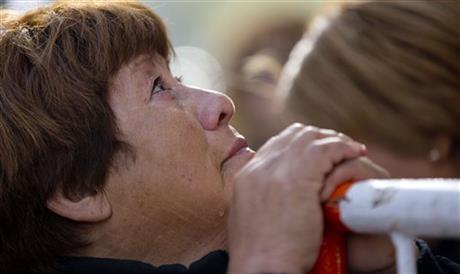
By MICHAEL WARREN
Victoria Sanchez, a supporter of Argentina’s President Cristina Fernandez, cries outside the Favaloro Hospital where Fernandez is undergoing surgery on her skull months after she suffered an unexplained head injury in Buenos Aires, Argentina, Tuesday, Oct. 8, 2013. Dozens of supporters of Argentina’s leader gather outside the Fundacion Favaloro, one of Argentina’s top cardiology hospitals, after keeping vigil there the night before. (AP Photo/Natacha Pisarenko)
BUENOS AIRES, Argentina (AP) — Doctors siphoned blood from beneath the skull of Argentine President Cristina Fernandez on Tuesday, relieving pressure on her brain two months after she suffered an unexplained head injury.
Buenos Aires Gov. Daniel Scioli confirmed that the operation concluded and said Fernandez was recovering inside one of Argentina’s top cardiology hospitals.
“We have received first word that the president has come out of surgery and is recovering from anesthesia,” Scioli announced. “If God desires it, she’s going to be back with us very soon, fully functioning.”
“Now we’re waiting for the doctors’ report,” he added, wishing her a rapid recovery.
Experts described the procedure as generally low risk and almost always having positive results. But the surgery involved drilling through the 60-year-old leader’s skull, and recovery can take months, worrying many Argentines who have struggled to imagine their country with anyone else at its center.
Hundreds of her supporters cheered and chanted at word she was recovering from the operation. Some had kept vigil through the night outside the Fundacion Favaloro, carrying signs, statues of Argentina’s virgin and messages such as “Fuerza Cristina,” urging her to show her strength.
The hospital was sealed off, and all inquiries were referred to presidential spokesman Alfredo Scoccimarro, who did not answer his phones.
Fernandez was diagnosed with “chronic subdural hematoma,” or fluid trapped between the skull and brain. This can happen when the tiny veins that connect the brain’s surface with its outermost covering, or dura, tear and leak blood. As people age, it can happen with a head injury so mild that they don’t remember it.
In the president’s case, doctors initially prescribed a month’s rest, because in some cases the fluid can be absorbed without intervention, but they decided on surgery after she complained of numbness and weakness in her upper left arm, in addition to the headaches and irregular heartbeats she has been suffering.
While messages of sympathy poured in, critics questioned the secrecy surrounding her health. Her condition was announced in a three-paragraph statement late Saturday after she spent more than nine hours in the hospital. It said she suffered a “traumatismo cranial” on Aug. 12, but gave no details on how this injury happened.
August 11 was a rough day for the president. Despite her intensive campaigning, primary election results that night showed a significant drop in support for her party’s candidates ahead of the Oct. 27 congressional elections.
Fernandez, who followed her highly popular husband into the presidency, has come to dominate Argentine politics after nearly six years in office, and now she’ll be off the campaign trail just three weeks before voting day.
Vice President Amado Boudou was put in charge as she was prepared for the surgery, although the government released no documents describing the extent of his powers, and critics debated how long he can remain in charge during her recovery without an act of Congress. Government websites began describing him as “the vice president in charge of the executive branch.”
Boudou, for his part, took Fernandez’s spot behind the podium in the Casa Rosada and told top officials in a televised address that he would run the country as a team “while she gets the rest she deserves.”
“What Cristina wants is for us to maintain the administration, and to carry on this project that (her late husband) Nestor Kirchner began and that Cristina has continued,” said Boudou, whose popularity has sunk amid ongoing corruption investigations.
Argentina’s constitution provides for, but does not require, a formal transfer of power in case of extended health problems, said Daniel Sabsay, a constitutional lawyer. A full medical leave would require congressional approval, but short of that, “she alone decides, according to the problem she faces and her doctors’ advice, if she needs to delegate some powers to the vice president,” he told Radio Continental.
“There needs to be more information to lower the people’s anxiety,” said Fabian Perechodnik, who directs the Poliarquia political consulting firm.
___
Associated Press writer Almudena Calatrava contributed to this report.



